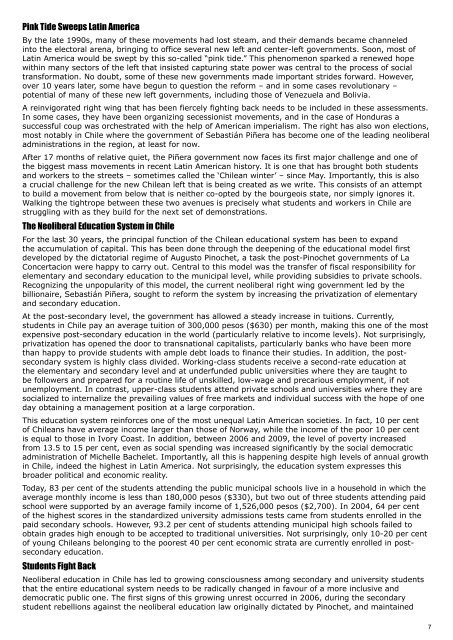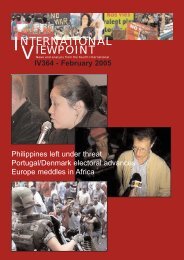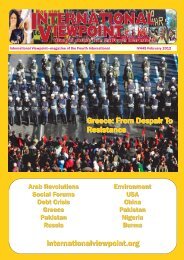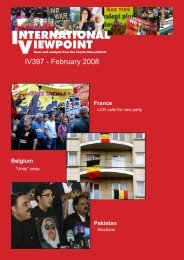here - International Viewpoint
here - International Viewpoint
here - International Viewpoint
You also want an ePaper? Increase the reach of your titles
YUMPU automatically turns print PDFs into web optimized ePapers that Google loves.
Pink Tide Sweeps Latin America<br />
By the late 1990s, many of these movements had lost steam, and their demands became channeled<br />
into the electoral arena, bringing to office several new left and center-left governments. Soon, most of<br />
Latin America would be swept by this so-called “pink tide.” This phenomenon sparked a renewed hope<br />
within many sectors of the left that insisted capturing state power was central to the process of social<br />
transformation. No doubt, some of these new governments made important strides forward. However,<br />
over 10 years later, some have begun to question the reform – and in some cases revolutionary –<br />
potential of many of these new left governments, including those of Venezuela and Bolivia.<br />
A reinvigorated right wing that has been fiercely fighting back needs to be included in these assessments.<br />
In some cases, they have been organizing secessionist movements, and in the case of Honduras a<br />
successful coup was orchestrated with the help of American imperialism. The right has also won elections,<br />
most notably in Chile w<strong>here</strong> the government of Sebastián Piñera has become one of the leading neoliberal<br />
administrations in the region, at least for now.<br />
After 17 months of relative quiet, the Piñera government now faces its first major challenge and one of<br />
the biggest mass movements in recent Latin American history. It is one that has brought both students<br />
and workers to the streets – sometimes called the ‘Chilean winter’ – since May. Importantly, this is also<br />
a crucial challenge for the new Chilean left that is being created as we write. This consists of an attempt<br />
to build a movement from below that is neither co-opted by the bourgeois state, nor simply ignores it.<br />
Walking the tightrope between these two avenues is precisely what students and workers in Chile are<br />
struggling with as they build for the next set of demonstrations.<br />
The Neoliberal Education System in Chile<br />
For the last 30 years, the principal function of the Chilean educational system has been to expand<br />
the accumulation of capital. This has been done through the deepening of the educational model first<br />
developed by the dictatorial regime of Augusto Pinochet, a task the post-Pinochet governments of La<br />
Concertacion were happy to carry out. Central to this model was the transfer of fiscal responsibility for<br />
elementary and secondary education to the municipal level, while providing subsidies to private schools.<br />
Recognizing the unpopularity of this model, the current neoliberal right wing government led by the<br />
billionaire, Sebastián Piñera, sought to reform the system by increasing the privatization of elementary<br />
and secondary education.<br />
At the post-secondary level, the government has allowed a steady increase in tuitions. Currently,<br />
students in Chile pay an average tuition of 300,000 pesos ($630) per month, making this one of the most<br />
expensive post-secondary education in the world (particularly relative to income levels). Not surprisingly,<br />
privatization has opened the door to transnational capitalists, particularly banks who have been more<br />
than happy to provide students with ample debt loads to finance their studies. In addition, the postsecondary<br />
system is highly class divided. Working-class students receive a second-rate education at<br />
the elementary and secondary level and at underfunded public universities w<strong>here</strong> they are taught to<br />
be followers and prepared for a routine life of unskilled, low-wage and precarious employment, if not<br />
unemployment. In contrast, upper-class students attend private schools and universities w<strong>here</strong> they are<br />
socialized to internalize the prevailing values of free markets and individual success with the hope of one<br />
day obtaining a management position at a large corporation.<br />
This education system reinforces one of the most unequal Latin American societies. In fact, 10 per cent<br />
of Chileans have average income larger than those of Norway, while the income of the poor 10 per cent<br />
is equal to those in Ivory Coast. In addition, between 2006 and 2009, the level of poverty increased<br />
from 13.5 to 15 per cent, even as social spending was increased significantly by the social democratic<br />
administration of Michelle Bachelet. Importantly, all this is happening despite high levels of annual growth<br />
in Chile, indeed the highest in Latin America. Not surprisingly, the education system expresses this<br />
broader political and economic reality.<br />
Today, 83 per cent of the students attending the public municipal schools live in a household in which the<br />
average monthly income is less than 180,000 pesos ($330), but two out of three students attending paid<br />
school were supported by an average family income of 1,526,000 pesos ($2,700). In 2004, 64 per cent<br />
of the highest scores in the standardized university admissions tests came from students enrolled in the<br />
paid secondary schools. However, 93.2 per cent of students attending municipal high schools failed to<br />
obtain grades high enough to be accepted to traditional universities. Not surprisingly, only 10-20 per cent<br />
of young Chileans belonging to the poorest 40 per cent economic strata are currently enrolled in postsecondary<br />
education.<br />
Students Fight Back<br />
Neoliberal education in Chile has led to growing consciousness among secondary and university students<br />
that the entire educational system needs to be radically changed in favour of a more inclusive and<br />
democratic public one. The first signs of this growing unrest occurred in 2006, during the secondary<br />
student rebellions against the neoliberal education law originally dictated by Pinochet, and maintained<br />
7









